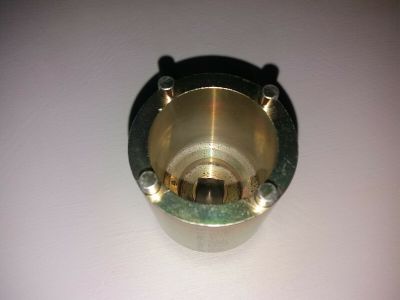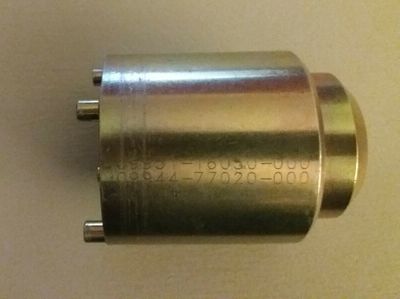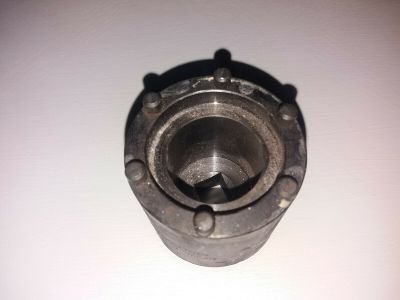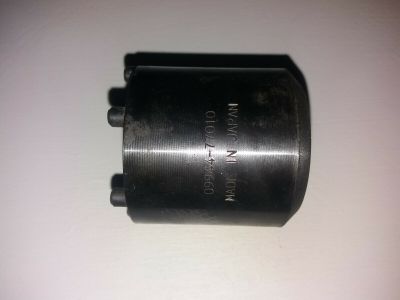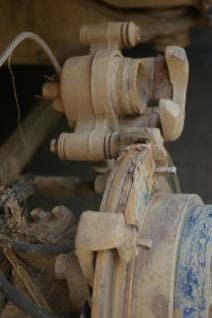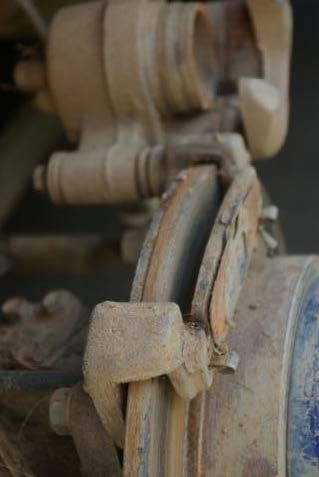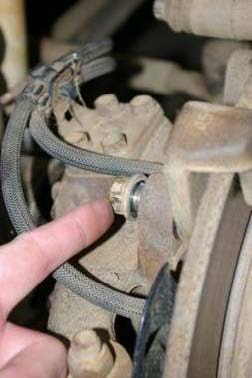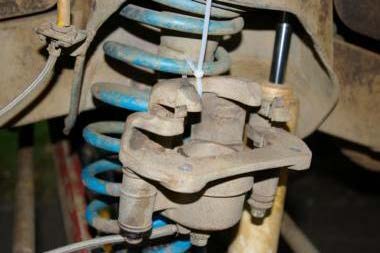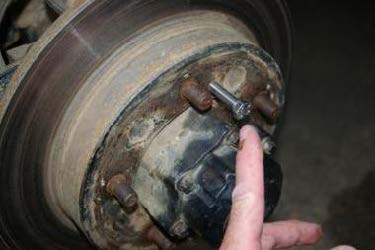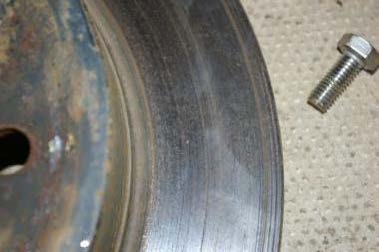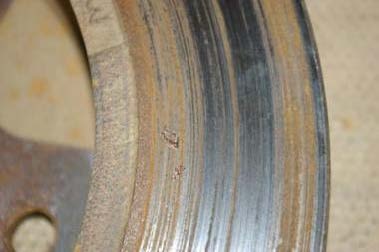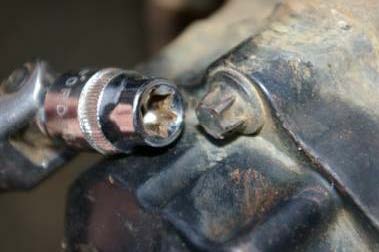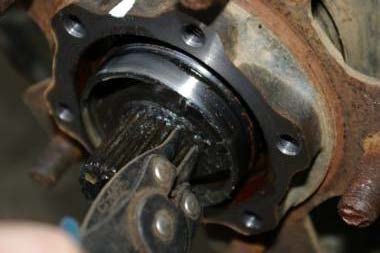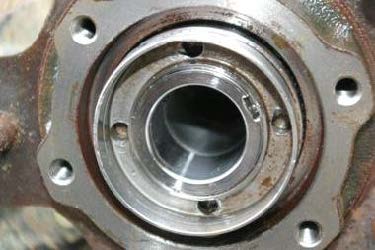Difference between revisions of "Front wheel bearing replacement"
(Added info about some of the required parts) |
m (Link correction) |
||
| (11 intermediate revisions by the same user not shown) | |||
| Line 5: | Line 5: | ||
| − | The Front Wheel Bearings on a Jimny can be prone to wearing, particularly when used off-road | + | The Front Wheel Bearings on a Jimny can be prone to wearing, particularly when used off-road or when using oversized tyres and/or wheel spacers. |
| − | |||
| − | |||
| − | The symptoms of worn | + | If you have the correct tools, replacing a front wheel bearing can be a straight forward task. |
| + | |||
| + | It is also closely tied in with changing/working on the kingpin bearings, so some of the steps are duplicated. | ||
| + | |||
| + | |||
| + | The general symptoms of worn wheel bearings: | ||
* Grating/Grinding as you rotate a jacked up wheel | * Grating/Grinding as you rotate a jacked up wheel | ||
* Steering Shimmy, see [[Death_Wobble | Death Wobble ]] | * Steering Shimmy, see [[Death_Wobble | Death Wobble ]] | ||
* Oil/Grease leaking from Swivel Joint | * Oil/Grease leaking from Swivel Joint | ||
| − | * Horizontal play in the front wheel | + | * Horizontal play in the front wheel |
| + | ** With the car jacked up, grip the wheel sides - there will be movement if they are worn. | ||
| + | *** Get an assistant to press the brakes while you are shaking the wheel - the movement should disappear. | ||
| − | [[File:leaky_swivel.jpg|thumb|left| | + | [[File:leaky_swivel.jpg|thumb|left|400px|Leaking front swivel]] |
* It is also common not to experience any play at all and to even pass an MOT with a really bad bearing. | * It is also common not to experience any play at all and to even pass an MOT with a really bad bearing. | ||
| − | * This is because the bearings | + | * This is because the Jimny front wheel bearings have dual inner race and only one race may have failed. |
<br clear=all> | <br clear=all> | ||
| − | == | + | == Prerequisites == |
| + | |||
| + | |||
| + | Before embarking onto any work, first comes the overview of the prerequisites. | ||
| + | |||
| + | |||
| + | === Required parts === | ||
| + | |||
| + | |||
| + | ==== The table ==== | ||
| + | |||
| + | |||
| + | <font face="courier"> | ||
| + | {| class="wikitable" | ||
| + | |+Required and recommended parts and fluids (for one side / wheel) | ||
| + | !Part name | ||
| + | !Quantity | ||
| + | !Suzuki P.N. | ||
| + | !Aftermarket replacements | ||
| + | !Comments | ||
| + | |- | ||
| + | |Wheel<br>bearing | ||
| + | |1 piece | ||
| + | |43462-84A00 | ||
| + | |Various | ||
| + | |Suzuki actually uses Koyo "DAC4168W HR4CS23" bearing under the stated OEM P.N. | ||
| + | |- | ||
| + | |Bearing<br>oil seal | ||
| + | |1 piece | ||
| + | |09283-54001 | ||
| + | |Various | ||
| + | |This part is usually available in the aftermarket only in a set together with the bearing.<br>Suzuki originally used the seal with inscriptions "Koyo" and "MHRD 54 69 7.5-9.5SJ" in a Jimny made in 2007. | ||
| + | |- | ||
| + | |C-clip | ||
| + | |1 piece | ||
| + | |09381-68001 | ||
| + | |Various | ||
| + | |This part is usually available in the aftermarket only in a set together with the bearing. | ||
| + | |- | ||
| + | |Bearing<br>grease | ||
| + | |A fistful<br>or so | ||
| + | |? | ||
| + | |<ul><li>[http://www.maximausa.com/product/waterproof-grease/ Maxima 80916]</li><li>[http://www.abro.com/lg-990.html Abro LG-990] <br>(here are<br>[https://abro-rus.ru/catalog/smazki-/smazka-litievaya-sinyaya-sinteticheskaya-3/?sphrase_id=5609 more detailed spec's])</li><li>Various others ...</li></ul> | ||
| + | |<ul><li>Sometimes comes together with the bearing<br>(otherwise use a high quality grease which is suitable for the application).</li><li>Proper grease selection and application is one of the most important parts of this job.</li><li>Read the notes below the table for more details.</li></ul> | ||
| + | |- | ||
| + | |A calendar<br>with<br>pictures of<br>(half)naked<br>women | ||
| + | |12<br>pictures<br>/<br>months | ||
| + | |Probably<br>with portraits<br>of Suzuki's<br>female<br>employees | ||
| + | |<ul><li>Claudia Schiffer</li><li>Ana Kournikova</li><li>Monica Bellucci</li><li>Salma Hayek</li><li>Pamela Anderson</li></ul> | ||
| + | |<ul><li>An essential part for pleasant working experience in most mechanical garages.</li><li>It is recommended to flip over calendar's pages / months one by one as you progress trough each step in this guide.</li></ul> | ||
| + | |} | ||
| + | </font> | ||
| + | |||
| + | |||
| + | ==== Parts offered in BigJimny Store ==== | ||
| + | |||
| + | |||
| + | The BigJimny Store has the following parts from the above table on sale: | ||
| + | * A complete [https://www.bigjimny.com/store/front-wheel-bearing-kit-suzuki-jimny.html 3-piece kit] (wheel bearing + oil seal + C-clip). | ||
| + | * Also a special [https://www.bigjimny.com/store/hub-nut-tool-suzuki-jimny.html front wheel hub nut unlock tool] from the list of required tools below. | ||
| + | * Sorry, no calendars with pictures of naked women (nor men for that matter) are in store's offer (yet)! | ||
| + | |||
| + | |||
| + | ==== Notes about greases ==== | ||
| + | |||
| + | |||
| + | General notes about the selection and application of greases: | ||
| + | * The longevity of a wheel bearing highly depends on it being properly coated with a grease which has adequate lubrication properties for the application in wheel bearings, as well as the grease having adequate water, oil, grit and temperature resistance. | ||
| + | * The list of recommended aftermarket greases in the above table is by no means complete. | ||
| + | ** Others are welcome to add their own recommendations to the lists! | ||
| + | |||
| + | |||
| + | Additional notes on Maxima 80916 grease: | ||
| + | * This heavy duty lithium grease is the grease of choice in [https://www.bigjimny.com/store/waterproof-grease.html BigJimny shop]. | ||
| + | * It has proven itself very well in practice with several Jimny owners. | ||
| + | |||
| + | Additional notes on Abro LG-990 grease: | ||
| + | * Forum user Bosanek has had very good experience with this fully synthetic lithium grease when used in a CV joint and in a wheel bearing. | ||
| + | * It claims to be particularly suited for bearings and it has a rather high heat resistance (almost 300 C liquifying point) and still claims good resistance against contaminants. | ||
| − | === | + | |
| + | === Required tools === | ||
| Line 34: | Line 118: | ||
}} | }} | ||
| − | {{warning|You will definitely need | + | {{warning|You will definitely need the special tool to release the locking hub nut.<br>Alternatively, you can hire a sorcerer specialized in mechanics.<br> |
(An ordinary magician won't suffice.)}} | (An ordinary magician won't suffice.)}} | ||
| − | === | + | Notes about special hub nut unlock tool: |
| + | * This tool is available both original from Suzuki and various aftermarket models. | ||
| + | * Suzuki has three original tool models: | ||
| + | *# <font face="courier">09951-16050</font>; | ||
| + | *#* 4-pin, interchangeable with <font face="courier">09944-77020</font>; | ||
| + | *#* Works on any Jimny 3; | ||
| + | *# <font face="courier">09944-77020</font>; | ||
| + | *#* 4-pin, interchangeable with <font face="courier">09951-16050</font>; | ||
| + | *#* Works on any Jimny 3; | ||
| + | *# <font face="courier">09944-77010</font>; | ||
| + | *#* 6-pin; | ||
| + | *#* This model is stronger and less fragile than the other two, but it works only on newer Jimnys 3 (usually post-2005) which have 6-holed hub locking nuts. | ||
| + | * A notable example of a cleverly designed aftermarket hub nut unlock tool is [https://www.zukparts.com/Suzuki-Jimny/Suzuki-Jimny-Vitara-wheel-bearing-tool Zukparts WBTool]. | ||
| + | ** Also available in [https://www.ebay.com.au/itm/Suzuki-Jimny-and-Vitara-wheel-bearing-spindle-hub-lock-nut-tool/122695267151?hash=item1c9135334f:g:g2sAAOSw9N1Vk7n5 their Ebay store]. | ||
| + | ** Its special value is that it works on multiple vehicle models: | ||
| + | *** "''Jimnys, Vitaras, Grand Vitaras up to 2004, Suzuki Sidekicks and Geo Trackers from the USA, SJ80 coil sprung Sierras & Samurais"''. | ||
| + | * A hardened Cr-Mo tool offered in [https://www.bigjimny.com/store/hub-nut-tool-suzuki-jimny.html BigJimny store]; | ||
| + | * Blue print [https://partsfinder.bilsteingroup.com/en_US/article/blueprint/ADK85503?make=Suzuki&model=Jimny+III+1998+- ADK85503]; | ||
| − | + | <gallery widths="400px" heights="300px" class="center" caption="Front wheel hub nut unlock tool Suzuki 09951-16050 / 09944-77020> | |
| − | + | File:Suzuki front wheel hub nut unlock tool - P.N. 09951-16050 and 09944-77020 - A01.jpg | |
| − | + | File:Suzuki front wheel hub nut unlock tool - P.N. 09951-16050 and 09944-77020 - A02.jpg | |
| − | + | </gallery> | |
| + | |||
| + | |||
| + | <gallery widths="400px" heights="300px" class="center" caption="Front wheel hub nut unlock tool Suzuki 09944-77010> | ||
| + | File:Suzuki front wheel hub nut unlock tool - P.N. 09944-77010 - A01.jpg | ||
| + | File:Suzuki front wheel hub nut unlock tool - P.N. 09944-77010 - A02.jpg | ||
| + | </gallery> | ||
| + | |||
| + | |||
| + | == Replacement procedure == | ||
| Line 50: | Line 160: | ||
| − | [[File:Caliper.jpg|thumb|left| | + | [[File:Caliper.jpg|thumb|left|400px|Jimny Front Caliper]] |
* First of all secure the car, release the wheel nuts and jack up the car and remove the road wheel. | * First of all secure the car, release the wheel nuts and jack up the car and remove the road wheel. | ||
| Line 56: | Line 166: | ||
<br clear=all> | <br clear=all> | ||
| − | [[File:Unbolt_caliper.jpg|thumb|left| | + | [[File:Unbolt_caliper.jpg|thumb|left|400px|Unbolting the caliper]] |
* Using a 12mm spanner, release the front caliper bolt (the left is the front of the car in this picture). | * Using a 12mm spanner, release the front caliper bolt (the left is the front of the car in this picture). | ||
| Line 62: | Line 172: | ||
<br clear=all> | <br clear=all> | ||
| − | [[File:Open_caliper.jpg|thumb|left| | + | [[File:Open_caliper.jpg|thumb|left|400px|Open brake caliper]] |
* The caliper then opens up using the rear bolt as a hinge. | * The caliper then opens up using the rear bolt as a hinge. | ||
<br clear=all> | <br clear=all> | ||
| − | [[File:Removing_pads.jpg|thumb|left| | + | [[File:Removing_pads.jpg|thumb|left|400px|Removing the brake pads]] |
* The pads are retained by small spring clips. | * The pads are retained by small spring clips. | ||
| Line 79: | Line 189: | ||
| − | [[File:Carrier_bolt.jpg|thumb| | + | [[File:Carrier_bolt.jpg|thumb|400px|left|Carrier bolt]] |
* The caliper is held on with two bolts at the rear. | * The caliper is held on with two bolts at the rear. | ||
| − | [[File:Carrier_to_spring.jpg|thumb| | + | [[File:Carrier_to_spring.jpg|thumb|400px|left|Caliper tied to Spring]] |
* Release the bolts and tie the caliper to the spring to keep it out of the way. | * Release the bolts and tie the caliper to the spring to keep it out of the way. | ||
<br clear=all> | <br clear=all> | ||
| − | [[File:Disc_removal.jpg|thumb| | + | [[File:Disc_removal.jpg|thumb|400px|left|Disc removal using bolt]] |
* Now the front brake disc can be removed. | * Now the front brake disc can be removed. | ||
| Line 100: | Line 210: | ||
New [https://www.bigjimny.com/store/brake-disc-suzuki-jimny-107mm.html disks] are available in the [https://www.bigjimny.com/store/ BigJimny Store]. | New [https://www.bigjimny.com/store/brake-disc-suzuki-jimny-107mm.html disks] are available in the [https://www.bigjimny.com/store/ BigJimny Store]. | ||
| − | <gallery widths= | + | <gallery widths=379 heights=252> |
Disc_front.jpg | Disc_front.jpg | ||
Disk_rear.jpg | Disk_rear.jpg | ||
| Line 110: | Line 220: | ||
| − | [[File:freewheelinghub.jpg|thumb| | + | [[File:freewheelinghub.jpg|thumb|400px|left|Torx bolt on hub]] |
* Now the Freewheeling Hub needs to be removed. | * Now the Freewheeling Hub needs to be removed. | ||
| Line 116: | Line 226: | ||
<br clear=all> | <br clear=all> | ||
| − | [[File:hubcirclip.jpg|thumb| | + | [[File:hubcirclip.jpg|thumb|400px|left|Removing the circlip]] |
* With the hub removed the driveshaft is exposed. | * With the hub removed the driveshaft is exposed. | ||
| Line 125: | Line 235: | ||
<br clear=all> | <br clear=all> | ||
| − | [[File:Hub_ring.jpg|thumb| | + | [[File:Hub_ring.jpg|thumb|400px|left|The hub nut]] |
* Now for the special tool. | * Now for the special tool. | ||
| Line 137: | Line 247: | ||
<br clear=all> | <br clear=all> | ||
| − | [[File:Hub_nut_tool.jpg|thumb| | + | [[File:Hub_nut_tool.jpg|thumb|400px|left|The hub nut tool]] |
* This is the tool. | * This is the tool. | ||
| Line 148: | Line 258: | ||
<br clear=all> | <br clear=all> | ||
| − | [[File:Front_bearing_seal.jpg |thumb| | + | [[File:Front_bearing_seal.jpg |thumb|400px|left|The bearing seal]] |
* With the hub face down on a surface you can now remove the bearing seal from the rear of the hub. | * With the hub face down on a surface you can now remove the bearing seal from the rear of the hub. | ||
| Line 154: | Line 264: | ||
<br clear=all> | <br clear=all> | ||
| − | [[File:Circlips.jpg |thumb| | + | [[File:Circlips.jpg |thumb|400px|left|C-Clips retain the bearing]] |
* Then you can use a pair of long nose pliers to remove the C-Clips that retain the bearing. | * Then you can use a pair of long nose pliers to remove the C-Clips that retain the bearing. | ||
| Line 160: | Line 270: | ||
<br clear=all> | <br clear=all> | ||
| − | [[File:Removing_the_front_bearing.jpg |thumb| | + | [[File:Removing_the_front_bearing.jpg |thumb|400px|left|Removing the bearing]] |
* Now comes the first bit that is supposed to be difficult. | * Now comes the first bit that is supposed to be difficult. | ||
| Line 169: | Line 279: | ||
<br clear=all> | <br clear=all> | ||
| − | [[File:Abkbearing1.jpg |thumb| | + | [[File:Abkbearing1.jpg |thumb|400px|left|Wheel Bearing Kit]] |
* The bearings are Koyo brand as standard. | * The bearings are Koyo brand as standard. | ||
| Line 179: | Line 289: | ||
| − | [[File:Removing_the_front_bearing.jpg |thumb| | + | [[File:Removing_the_front_bearing.jpg |thumb|400px|left|Removing the bearing]] |
* Suzuki says the new bearing needs to be pressed into place. | * Suzuki says the new bearing needs to be pressed into place. | ||
| Line 192: | Line 302: | ||
| − | [[File:Circlips.jpg |thumb| | + | [[File:Circlips.jpg |thumb|400px|left|C-Clips retain the bearing]] |
* Once it is cooled put grease into the ends of the bearing. | * Once it is cooled put grease into the ends of the bearing. | ||
| Line 201: | Line 311: | ||
<br clear=all> | <br clear=all> | ||
| − | [[File:Hub_ring.jpg|thumb| | + | [[File:Hub_ring.jpg|thumb|400px|left|The hub nut]] |
* Grease the hub nut and tighten the nut using the special tool | * Grease the hub nut and tighten the nut using the special tool | ||
| Line 213: | Line 323: | ||
| − | + | == Torque Settings == | |
| Line 220: | Line 330: | ||
{{Edited}} | {{Edited}} | ||
| − | [[Category:Howto]][[Category:Steering]] | + | |
| + | [[Category:Howto - gen3]] | ||
| + | [[Category:Steering - gen3]] | ||
Latest revision as of 07:51, 19 December 2019
![]() The content of any article might be expanded / improved in the future - revisit it sometimes.
The content of any article might be expanded / improved in the future - revisit it sometimes.
![]() Seen a mistake? Know something that isn't written? Edit and change this article yourself!
Seen a mistake? Know something that isn't written? Edit and change this article yourself!
![]() Some images in the article (if present) can be enlarged by clicking on them.
Some images in the article (if present) can be enlarged by clicking on them.
Contents
Introduction
The Front Wheel Bearings on a Jimny can be prone to wearing, particularly when used off-road or when using oversized tyres and/or wheel spacers.
If you have the correct tools, replacing a front wheel bearing can be a straight forward task.
It is also closely tied in with changing/working on the kingpin bearings, so some of the steps are duplicated.
The general symptoms of worn wheel bearings:
- Grating/Grinding as you rotate a jacked up wheel
- Steering Shimmy, see Death Wobble
- Oil/Grease leaking from Swivel Joint
- Horizontal play in the front wheel
- With the car jacked up, grip the wheel sides - there will be movement if they are worn.
- Get an assistant to press the brakes while you are shaking the wheel - the movement should disappear.
- With the car jacked up, grip the wheel sides - there will be movement if they are worn.
- It is also common not to experience any play at all and to even pass an MOT with a really bad bearing.
- This is because the Jimny front wheel bearings have dual inner race and only one race may have failed.
Prerequisites
Before embarking onto any work, first comes the overview of the prerequisites.
Required parts
The table
| Part name | Quantity | Suzuki P.N. | Aftermarket replacements | Comments |
|---|---|---|---|---|
| Wheel bearing |
1 piece | 43462-84A00 | Various | Suzuki actually uses Koyo "DAC4168W HR4CS23" bearing under the stated OEM P.N. |
| Bearing oil seal |
1 piece | 09283-54001 | Various | This part is usually available in the aftermarket only in a set together with the bearing. Suzuki originally used the seal with inscriptions "Koyo" and "MHRD 54 69 7.5-9.5SJ" in a Jimny made in 2007. |
| C-clip | 1 piece | 09381-68001 | Various | This part is usually available in the aftermarket only in a set together with the bearing. |
| Bearing grease |
A fistful or so |
? |
|
|
| A calendar with pictures of (half)naked women |
12 pictures / months |
Probably with portraits of Suzuki's female employees |
|
|
Parts offered in BigJimny Store
The BigJimny Store has the following parts from the above table on sale:
- A complete 3-piece kit (wheel bearing + oil seal + C-clip).
- Also a special front wheel hub nut unlock tool from the list of required tools below.
- Sorry, no calendars with pictures of naked women (nor men for that matter) are in store's offer (yet)!
Notes about greases
General notes about the selection and application of greases:
- The longevity of a wheel bearing highly depends on it being properly coated with a grease which has adequate lubrication properties for the application in wheel bearings, as well as the grease having adequate water, oil, grit and temperature resistance.
- The list of recommended aftermarket greases in the above table is by no means complete.
- Others are welcome to add their own recommendations to the lists!
Additional notes on Maxima 80916 grease:
- This heavy duty lithium grease is the grease of choice in BigJimny shop.
- It has proven itself very well in practice with several Jimny owners.
Additional notes on Abro LG-990 grease:
- Forum user Bosanek has had very good experience with this fully synthetic lithium grease when used in a CV joint and in a wheel bearing.
- It claims to be particularly suited for bearings and it has a rather high heat resistance (almost 300 C liquifying point) and still claims good resistance against contaminants.
Required tools
- Standard metric sockets and spanners
- Assorted screwdrivers
- Hub nut unlock tool
- Circlip pliers (External)
- An E10 Torx socket for the Vacuum Hub Bolts
- A ball joint splitter
- 1" Imperial Socket
- G-Clamp or brake piston retractor
![]() You will definitely need the special tool to release the locking hub nut.
You will definitely need the special tool to release the locking hub nut.
Alternatively, you can hire a sorcerer specialized in mechanics.
(An ordinary magician won't suffice.)
Notes about special hub nut unlock tool:
- This tool is available both original from Suzuki and various aftermarket models.
- Suzuki has three original tool models:
- 09951-16050;
- 4-pin, interchangeable with 09944-77020;
- Works on any Jimny 3;
- 09944-77020;
- 4-pin, interchangeable with 09951-16050;
- Works on any Jimny 3;
- 09944-77010;
- 6-pin;
- This model is stronger and less fragile than the other two, but it works only on newer Jimnys 3 (usually post-2005) which have 6-holed hub locking nuts.
- 09951-16050;
- A notable example of a cleverly designed aftermarket hub nut unlock tool is Zukparts WBTool.
- Also available in their Ebay store.
- Its special value is that it works on multiple vehicle models:
- "Jimnys, Vitaras, Grand Vitaras up to 2004, Suzuki Sidekicks and Geo Trackers from the USA, SJ80 coil sprung Sierras & Samurais".
- A hardened Cr-Mo tool offered in BigJimny store;
- Blue print ADK85503;
- Front wheel hub nut unlock tool Suzuki 09951-16050 / 09944-77020
- Front wheel hub nut unlock tool Suzuki 09944-77010
Replacement procedure
Removing the Caliper and pads
- First of all secure the car, release the wheel nuts and jack up the car and remove the road wheel.
- This then reveals the brake caliper, this is the passenger side (nearside) caliper (UK)
- Using a 12mm spanner, release the front caliper bolt (the left is the front of the car in this picture).
- Then loosen the same bolt on the rear of the caliper.
- The caliper then opens up using the rear bolt as a hinge.
- The pads are retained by small spring clips.
- A simple pull on the pads (horizontally away from the disk) should remove them.
- If the pads resist, gently prise out the pads with a small screwdriver - do not remove the spring clips.
- If you require new pads, spring clips or a caliper fitting kit then these are available in the BigJimny Store.
Removing the Brake Disc
- The caliper is held on with two bolts at the rear.
- Release the bolts and tie the caliper to the spring to keep it out of the way.
- Now the front brake disc can be removed.
- If you are lucky it will simply pull off but if you have problems then there are two M8 holes in the disk hub.
- Simply run two bolts into these holes and the disk will push off the hub.
- The picture shows a bolt being used to push the disk off the hub.
My disk appeared to be ok on the visible side but the rear showed some bad wear so I will change them as part of this job.
New disks are available in the BigJimny Store.
Dismantling the Hub
- Now the Freewheeling Hub needs to be removed.
- Suzuki have used Torx bolts to secure these so you will require an E10 socket to remove the bolts.
- With the hub removed the driveshaft is exposed.
- The driveshaft is retained with a circlip so use a pair of circlip pliers to remove it.
- This is really fiddly and can be an annoying task.
- Behind the circlip is a rectangular washer that should also be removed.
- Note that I have also marked with white paint the orientation of the freewheeling hub, this is not strictly needed.
- Now for the special tool.
- The hub is held on by a special round nut that requires a special tool to release it.
- The outside of the nut is a smooth polished ring which is part of the vacuum seal so it must not be damaged.
- Otherwise you will need a new nut (which is exceedingly expensive!).
- In the centre of the nut, the edge is bent over into a slot to help secure it.
- The slot can be seen in the photo in the “2 o’clock” position.
- Use a blade to bend the edge back into line.
- It is essential that this is completely free, otherwise it is impossible to undo the nut and you will break the tool.
- This is the tool.
- It is available from the BigJimny Store.
- Make sure that the tool and the nut are completely clean as the tool will not fit.
- Make sure the tool is inserted into the nut correctly with the pins all in the holes in the nut.
- You are really going to have to swing on the nut to release it.
- I had to use a long breaker bar AND a piece of scaffold tube.
- With the nut removed the hub should be removeable, it might need a pull with a slide hammer, mine just pulled off by hand.
- With the hub face down on a surface you can now remove the bearing seal from the rear of the hub.
- I prised mine out with a screwdriver.
- Then you can use a pair of long nose pliers to remove the C-Clips that retain the bearing.
- Note that these may be corroded in and difficult to even see at first.
- Now comes the first bit that is supposed to be difficult.
- Suzuki say that the bearing needs to be removed using a press.
- I decided to have a go myself - using an old piece of bearing and a steel pin I hammered out the bearing and it only took two or three swift blows.
- The picture shows the steel pin resting on the bearing before being hit.
- Note the use of the brake disk to provide a holder for the hub allowing the bearing to be driven out of the bottom.
- The bearings are Koyo brand as standard.
- The BigJimny store has a kit available which includes the seal and the c-clips (not all kits contain the c-clips), the Wheel Bearing Kit is here.
The rebuild
- Suzuki says the new bearing needs to be pressed into place.
- I decided to try a bit of school boy physics.
- I coated the bearing in Copper Grease and then put it in the deep freeze overnight.
- The hub was placed in the oven at 180 degrees for 30 minutes.
- So with an ice cold bearing and a very hot hub I put the bearing in the hub, placed the old bearing ring and the steel pin on top and tapped the bearing straight into place.
- It took two gentle hits!
- Again note the use of the brake disk to hold the hub.
- Once it is cooled put grease into the ends of the bearing.
- Then insert the new circlip and the oil seal.
- I found that the oil seal pressed in ok by hand once coated in Copper Grease.
- The oil seal has a protruding lip, this must be to the outside of the joint.
- Grease the inside of the bearing and slide the hub back onto the driveshaft.
- Grease the hub nut and tighten the nut using the special tool
- Torque it to 220NM or 160ft lbs – ie. really tight!.
- Use a punch to bend the inner lip of the nut to lock it in place.
- Refit the hub thrust washer and circlip to the driveshaft.
- Fit the disk and fit the caliper (Caliper bolts 61ft/lbs), brake pads and bolt the caliper down in position (Caliper pin bolt 16/ft/lbs)
- Re-fit the wheel and lower the vehicle.
Torque Settings
Full details of the torque settings can be found in the reference data
Page last edited on 19/12/2019 by user Bosanek

